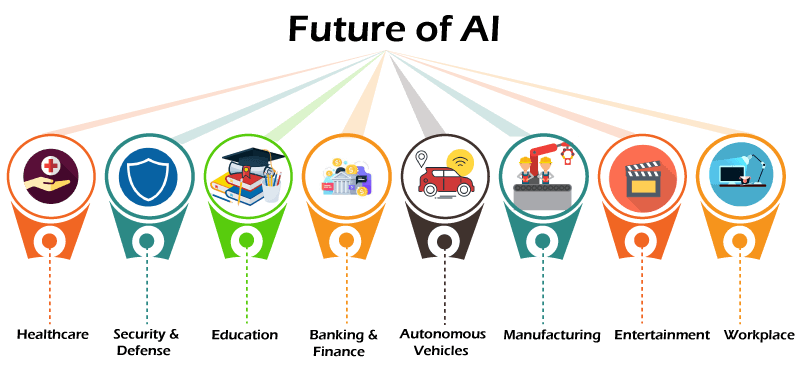The Impact of AI on Modern Society
5 min read · May 15, 2024
Introduction: Artificial Intelligence (AI) has emerged as one of the most transformative technologies of our time. From enhancing business operations to revolutionizing healthcare and driving autonomous vehicles, AI's potential is vast. This article explores the impact of AI on various sectors, the ethical considerations, and the future outlook of this rapidly advancing field.
AI in Business
Function: AI technologies streamline operations, enhance decision-making, and provide insights through data analysis.
Applications: Predictive analytics, customer relationship management (CRM), supply chain optimization.
Benefits: Increased efficiency, cost reduction, improved customer experience.
Challenges: Data privacy concerns, implementation costs, the need for skilled personnel.
AI has revolutionized business processes through automation and data-driven decision-making. Predictive analytics allow companies to forecast trends, optimize inventory, and personalize marketing strategies. CRM systems enhanced with AI can provide deeper insights into customer behavior, leading to better customer service and increased sales. Supply chain optimization powered by AI helps in reducing costs and improving delivery times.
However, integrating AI into business operations presents challenges. Data privacy is a significant concern, as businesses must ensure compliance with regulations like GDPR. The cost of implementing AI solutions can be prohibitive for smaller companies, and there is a growing need for skilled professionals who can develop, implement, and maintain AI systems.

AI in Healthcare
Function: AI assists in diagnosing diseases, personalizing treatment plans, and managing patient data.
Applications: Medical imaging analysis, predictive modeling for disease outbreaks, virtual health assistants.
Benefits: Improved diagnostic accuracy, personalized medicine, enhanced patient care.
Challenges: Ethical concerns, data security, regulatory hurdles.
AI is transforming healthcare by enabling early and accurate disease diagnosis, personalizing treatment plans, and improving patient outcomes. Medical imaging analysis powered by AI can detect anomalies in scans faster and more accurately than traditional methods. Predictive modeling helps in anticipating disease outbreaks, allowing for timely interventions. Virtual health assistants provide 24/7 support to patients, improving access to healthcare services.
Despite these benefits, AI in healthcare faces several challenges. Ethical concerns arise around data privacy and the potential for bias in AI algorithms. Ensuring the security of sensitive patient data is paramount, and healthcare providers must navigate complex regulatory landscapes to implement AI solutions. Additionally, the reliance on AI raises questions about accountability and the potential for AI to replace human healthcare providers.
AI in Transportation
Function: AI enhances transportation through autonomous driving, traffic management, and route optimization.
Applications: Self-driving cars, smart traffic signals, logistics and delivery optimization.
Benefits: Reduced traffic congestion, lower accident rates, efficient logistics.
Challenges: Safety concerns, regulatory issues, high development costs.
AI is revolutionizing transportation by enabling the development of autonomous vehicles, optimizing traffic flow, and improving logistics. Self-driving cars promise to reduce traffic accidents and make transportation more efficient. Smart traffic signals use AI to adapt to real-time traffic conditions, reducing congestion and improving commute times. AI-driven logistics and delivery systems optimize routes, cutting down on fuel consumption and delivery times.
However, the integration of AI in transportation is not without challenges. Safety concerns are paramount, as autonomous vehicles must be rigorously tested to ensure they can safely navigate complex driving environments. Regulatory issues also pose a challenge, as governments must develop frameworks to govern the use of AI in transportation. The high development costs of AI technology can be a barrier to widespread adoption.
Ethical Considerations in AI
Bias and Fairness: Ensuring AI systems are fair and unbiased, addressing disparities in data.
Privacy: Protecting user data and ensuring transparency in data usage.
Accountability: Determining responsibility for AI-driven decisions and actions.
Security: Safeguarding AI systems from malicious attacks and misuse.
The ethical considerations surrounding AI are critical to its responsible development and deployment. Bias and fairness in AI systems are significant concerns, as biased algorithms can perpetuate existing inequalities and discrimination. Ensuring that AI systems are transparent and that their decision-making processes can be understood and challenged is essential for maintaining public trust.
Privacy is another major ethical consideration. AI systems often rely on vast amounts of personal data, raising concerns about how this data is collected, stored, and used. Ensuring data security and protecting user privacy is paramount. Additionally, the question of accountability is crucial—determining who is responsible for the actions and decisions made by AI systems, particularly in critical areas such as healthcare and transportation.
Security is a pressing concern, as AI systems can be vulnerable to hacking and malicious attacks. Ensuring the robustness and security of AI systems is essential to prevent misuse and protect sensitive information.
Current Trends in AI
AI and Big Data: The synergy between AI and big data is driving advancements in various fields by enabling more accurate predictions and personalized experiences.
AI in Cybersecurity: AI is increasingly being used to detect and respond to cyber threats in real-time, enhancing the security of digital infrastructures.
AI in Finance: Financial institutions are leveraging AI for fraud detection, risk management, and personalized financial services.
AI and Robotics: The integration of AI with robotics is leading to advancements in manufacturing, healthcare, and service industries, with robots performing tasks that require precision and consistency.
The current trends in AI are shaping the future of technology and society. The combination of AI and big data is unlocking new possibilities, as AI algorithms can analyze vast datasets to identify patterns, make predictions, and provide personalized experiences. This synergy is driving advancements in fields such as marketing, healthcare, and finance.
AI is playing an increasingly important role in cybersecurity. AI-powered systems can detect anomalies and potential threats in real-time, enabling quicker responses to cyber attacks and enhancing the security of digital infrastructures. In finance, AI is being used for fraud detection, risk management, and providing personalized financial services to customers.
The integration of AI with robotics is another significant trend. AI-powered robots are being used in manufacturing to perform tasks that require precision and consistency. In healthcare, robots assisted by AI are being used for surgeries, rehabilitation, and patient care. The service industry is also seeing the use of AI-powered robots for customer service and logistics.

Future Outlook of AI
Advancements: AI is expected to continue evolving, with advancements in machine learning, natural language processing, and robotics.
Integration: AI will become more integrated into everyday life, from smart homes to personalized education.
Regulation: The development of robust regulatory frameworks to manage AI's ethical and societal impacts.
Collaboration: Increased collaboration between governments, industries, and academia to foster responsible AI development.
The future outlook of AI is both exciting and complex. Advancements in machine learning, natural language processing, and robotics are expected to drive AI forward, making it more capable and versatile. AI will become increasingly integrated into everyday life, from smart homes that can anticipate our needs to personalized education systems that adapt to individual learning styles.
As AI continues to advance, the development of robust regulatory frameworks will be crucial to manage its ethical and societal impacts. Ensuring that AI is developed and used responsibly will require collaboration between governments, industries, and academia. This collaboration will help to address challenges, set standards, and promote best practices in AI development and deployment.
Conclusion: The impact of AI on modern society is profound and far-reaching. As we navigate the challenges and opportunities presented by AI, it is crucial to adopt a balanced approach that maximizes benefits while addressing ethical and societal concerns. The future of AI holds immense promise, and with thoughtful stewardship, it can significantly enhance our lives and transform industries for the better.